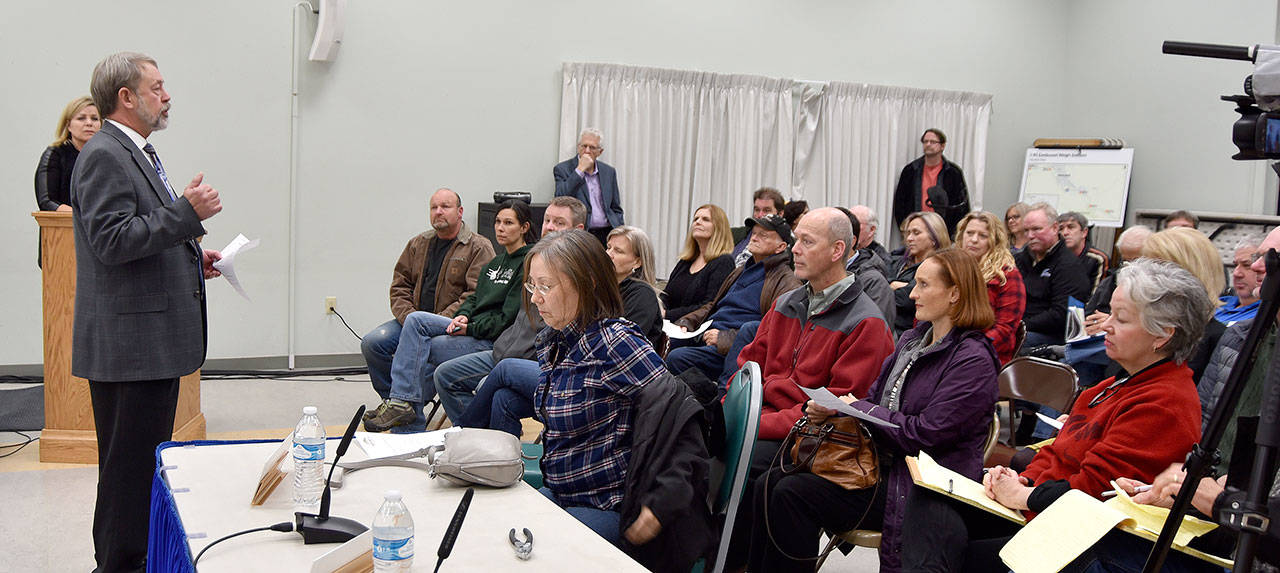Snoqualmie’s weigh station, located at the S.R. 18 and Interstate 90 interchange, has got to go. It’s too small for Washington State Patrol staff to do any sort of inspection on overweight trucks, says WSP Captain Michael Dahl, and besides, there won’t be room for it there once the future improvements planned for that interchange in 2019 begin.
Dahl and several officers from WSP took questions from a boisterous, standing-room-only audience at the Mount Si Senior Center last week, on their plans to relocate the weigh station to one of five possible spots along eastbound I-90.
The possible site closest to North Bend, at milepost 33.5, was most appealing to Dahl, he said, because it was big enough for inspections, for parking trucks put out of service due to a failed inspection, plus any other drivers that may need a rest.
“We can put up to 70 trucks there,” he said, “off the freeway, safe and clean.”
It also could eventually house a detachment of state patrolmen, once the department reaches full staffing levels again, he noted. Currently, WSP has openings for about 85 patrolmen.
Those patrols will help improve safety for all drivers, Dahl said, emphasizing that safety was the biggest benefit the new station could offer to North Bend residents.
“Right now, we have a hole in our fence and it’s a big one,” he said.
The freeways around North Bend see at least 4,500 trucks a day, according to an in-road sensor counting trucks in the far right lane of the freeway near Dahl’s preferred site, he said. In-road sensor also calculate each truck’s approximate weight to determine if they need to stop at the station for weighing and inspection.
Of the trucks flagged for inspection — about 9,000 each year — Dahl said 28 percent of them are immediately put out of service for some violation. However, with the limited capacity of the existing weigh station outside Snoqualmie, the station was frequently closed and trucks weren’t getting inspected.
North Bend staff and citizens were also focused on safety concerns, but for the environment and to local businesses, when they raised their objections.
City Administrator Londi Lindell noted that the city was only involved in the discussion because the preferred site would require environmental reviews at the state and federal levels. Also, she said, “we disagree with some of the cost estimates,” to build the station there, about $19.3 million according to the study, because of its location above the Snoqualmie River and close to a wellhead. Three other sites listed in the study appeared to be better choices, she said, and “We’d like to see further study done.”
Mayor Ken Hearing led a chorus of complaints to the tune of North Bend having already paid its dues to support truck traffic. He noted that the city has a 200-stall truck stop off Exit 34 and Lindell specified that although the city does not allow trucks to park on city streets on normal days, it does allow them to do so in inclement weather.
“We’ve pushed back to the state,” Hearing told the large audience. “We said we’ve done enough for trucks in North Bend.”
Truck traffic brings challenges of noise and air pollution, traffic congestion and occasional litter, Hearing said, and “An awful lot of truckers are not sensitive to the needs of the community.” However, he said, the city is not anti-truck as it had been labeled for a previous vote to prohibit future development of truck stops.
“Why North Bend?” asked Jean Buckner, a North Bend resident. “Everybody in the region benefits from getting goods off trucks… We feel that we’ve paid our price for many years.”
A speaker from Camp Waskowitz strongly urged choosing another location rather than potentially affecting the camp’s environment and water safety. She noted the camp serves more than 6,000 children each year and said “it doesn’t make sense to put (a weigh station) where it will disrupt an organization that has done so much.”
Several truck drivers also spoke at the meeting, in defense of their livelihoods and their own practices at the meeting.
Lindell reminded those present that “this is just the beginning of the discussion,” and thanked State Senator Mark Mullet, who was instrumental in getting the funding and the higher priority ranking of the I-90/S.R. 18 interchange improvements to be approved by the State Legislature.
The project is scheduled to begin in 2019, and Washington Department of Transportation officials have noted that the weigh station is a very small, and undecided, piece of the overall project.
“We would like to move the weigh station, but whether or not we can move it to meet the needs of the Washington State Patrol remains to be seen,” said Kris Olsen, WSDOT spokeswoman for the Northwest Region.
According to a WSDOT report on the preliminary sites “Relocating the existing weigh station at the I-90/SR 18 interchange is necessary for the efficiency of the proposed interchange improvements as well as address Washington State Patrol’s needs to carry out commercial vehicle enforcement responsibilities such as weighing vehicles and safety inspections.”
The weigh station relocation, as a component of the overall S.R. 18/I-90 interchange project is still in the very preliminary stages, Olson noted. “We are still in process of selecting the consultant on the overall project.”
The consultant would be required to investigate the potential sites and identify other candidates for weigh station locations, Olson said. Each location will be considered for compatibility with the needs of the state patrol and the truck traffic, as well as environmental reviews.
Other sites considered included: milepost 28.4, East of the Winery Road interchange; milepost 36.2, between the 468th Avenue interchange and West Homestead Valley Road interchange; milepost 38.8, between the East and West Homestead Valley Road interchanges; and milepost 80.3, West of the Bullfrog Road interchange.
For current project information, visit the website at http://www.wsdot.wa.gov/projects/i90/sr18icimprove.


